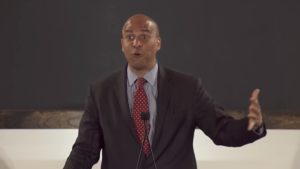
U.S. Sen. Cory Booker (D-NJ) first rose to national prominence as mayor of Newark. Last month, he addressed the American Federation for Children during its annual gathering in Washington, where he described how an educational transformation is helping revitalize the city.
Here is an excerpt from his remarks, now available in full on YouTube, lightly edited for clarity and length.
I am so proud that by the time I left in 2013, Newark was not only experiencing its biggest economic development period in 60 years, its first new hotels in 40 years, its first office towers in decades; it was not only seeing drops in crime, it was not only experiencing the biggest refurbishing of its parks, but perhaps most significantly, it was the first time in Newark’s history, 60 years at least, that the population was growing again. People were moving back.
There’s an anecdote I have about what was making that happen. There was one time I was with my security detail, going to one of our innovative schools in Newark.
The police officer that was with me just looked sort of stunned. I was asking him, “What’s wrong? Am I being threatened again? Is it an ex-girlfriend coming after me again?”
He said, “No, I just did not know there were schools like this that existed, not just in Newark, but anywhere.” And before you knew it, he moved his family back to Newark, New Jersey.
Newark has gone through, in the last decade, an astonishing change, when it comes to school choice, when it comes to a massive expansion of opportunities for our children.
Things that I talked about with people in this room, more than a decade ago, that were some of my toughest political battles, now have become a reality, with about 40 percent of our kids not just in charter schools, but we have one of the top-three highest-performing charter sectors in the United States of America.
In fact, in my city, which is majority-African-American, the number of kids now that are going to schools that beat the state proficiency average over the last decade has gone up 300 percent for African-American children, and the number of African-American kids going to high-performing schools has gone up 200 percent. Newark was just noticed by a [Center on Reinventing Public Education] study of schools … [as] the no. 1 city in American for so-called “beat-the-odds” schools that are high-poverty and high performing.
We have a lot to brag about in Newark, in this cauldron of educational creativity we’ve created, that has been liberating the choice of our parents.
As the Brookings Institution said, Newark is now the no. 4 city in the country for offering parents real school choice.
So for me, this is not an academic discussion anymore. This, to me, is families that I know, neighborhoods. I’ve seen the kind of transformation that could be made. I see how kids who have no history of college in their families suddenly had the arc of their families’ trajectory changed, as they’ve been liberated from what I call the imprisonment of institutions of failure, and now have pathways to institutions of excellence, all the way through college.
…
We all have rights to equal opportunity. We are the last generation, fighting the last big battle to make true on that — that a child born anywhere in American, from any parents, a child no matter what their race or religion or socio-economic status should have that pathway, should have that equal opportunity, and there is nothing more fundamental to that than education. That is the great liberation.



[…] month Sen. Booker gave a speech at the American Federation for Children annual meeting in D.C. Here’s an excerpt, or you can […]